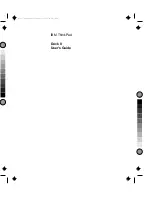
17
Knowing the Parts
2
6
7
8
9
1394 Port
IEEE1394 is a high speed serial bus like SCSI but has simple connections and hot-
plugging capabilities like USB. The interface IEEE1394 has a bandwidth of 100-400
Mbits/sec and can handle up to 63 units on the same bus. IEEE1394 is also used in
high-end digital equipment and should be marked “DV” for Digital Video port.
PC Card Slot
One PCMCIA 2.1 compliant PC Card socket is available to support one type I/II PC card. The
socket supports 32-bit CardBus. This allows accommodation of Notebook PC expansion
options such as memory cards, ISDN, SCSI, Smart Cards, and wireless network adapters.
PC Card Eject
Use this button to eject optional PC cards. This button is mechanical (not electronic) so a
small force is required and the Notebook PC does not have to be turned ON to eject PC cards.
10
10
11
Infrared Port (IrDA) (on selected models)
The infrared (IrDA) communication port allows convenient wireless data communication
with infrared-equipped devices or computers. This allows easy wireless synchronization
with PDAs or mobile phones and even wireless printing to printers. If your office supports
IrDA networking, you can have wireless connection to a network anywhere provided there
is a direct line of sight to an IrDA node. Small offices can use IrDA technology to share a printer between
several closely placed Notebook PCs and even send files to each other without a network.
Audio Speaker
The built-in stereo speaker system allows you to hear audio without additional attachments. The multimedia
sound system features an integrated digital audio controller that produces rich, vibrant sound (results
improved with external stereo headphones or speakers). Audio features are software controlled.
12
12
SPDIF Output Jack
This jack provides connection to SPDIF (Sony/Philips Digital Interface) compliant devices
for digital audio output. Use this feature to turn the Notebook PC into a hi-fi home
entertainment system.
Headphone Output Jack
The stereo headphone jack (1/8 inch) is used to connect the Notebook PC’s audio out signal to
amplified speakers or headphones. Using this jack automatically disables the built-in speakers.
Combo
Flash Memory Slot
Normally a PCMCIA or USB memory card reader must be purchased separately in order to
use memory cards from devices such as digital cameras, MP3 players, mobile phones, and
PDAs. This Notebook PC has a built-in memory card reader that can read many flash memory
cards as specified later in this manual. The built-in memory card reader is not only convenient,
but also faster than most other forms of memory card readers because it utilizes the high-
bandwidth PCI bus.
Содержание A3Ac
Страница 1: ...Notebook PC Hardware User s Manual E2224 Aug 2005 ...
Страница 4: ...4 Contents ...
Страница 10: ...10 1 Introducing the Notebook PC ...
Страница 11: ...11 2 Knowing the Parts Basic sides of the Notebook PC ...
Страница 22: ...22 2 Knowing the Parts ...
Страница 69: ...69 Appendix A ...
















































